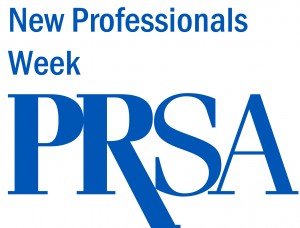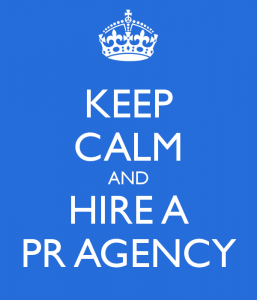 I love planning events for the New Professionals Section, especially when they involve a national week-long event celebrating young professionals! You can never have enough young professionals in your Chapter; after all, they are the future.
I love planning events for the New Professionals Section, especially when they involve a national week-long event celebrating young professionals! You can never have enough young professionals in your Chapter; after all, they are the future.
This year, during November 11-15, we will host our third annual New Professionals Week. This week was designed to celebrate young professionals, but also to help connect young PR pros with their local PRSA chapter.
Who’s invited? Everyone. We’re encouraging anyone who’s interested in this week to get involved! PRSA New Pros National Executive Committee will support your local event via guest blog posts and social media channels.
How can you get involved? To help plan events in your local Chapter, visit our website and download a fact sheet and an event registration form. This website will be the hub for all events held during New Pros Week. Once registration forms are submitted, you’ll be able to see a list of events on our website, promoting local events. If you are interested in contributing to our blog to promote your Chapter NPWeek event, contact blog co-chairs, Heather Sliwinski and Keri Cook.
We understand that not every Chapter may have a budget to host an event this year. For those of you who have tight budgets, here are a few budget friendly ways to participate:
- Host a private showing of a New Pros webinar. During New Pros Week, we feature a national webinar on a topic of interest for new pros. We anticipate the webinar will be held in the afternoon on Monday, Nov. 11. To host a private showing – invite local new pros to an office, bring a bag lunch and have a discussion after the presentation. The playback will also be available through PRSA’s on-demand service, and our guest speaker can be reached throughout the week for questions via Twitter.
- Host a New Pros-focused Chapter meeting. What topics are particularly interesting to young professionals? What issues are they concerned with during their first few years as a PR professional? Schedule a Chapter meeting during this week and cover one of these topic(s) and/or issue(s).
- Participate in New Pros week via our social networks and blog. Follow our hashtag #NPWeek to join the coast-to-coast virtual networking. You could even schedule a Twitter chat or tweet-up for new pros in your area to meet via social, and then take it off-line! We’re always looking for a fresh, new perspective on any aspect of PR for our blog: consider drafting a post about your Chapter’s local new pros group or your personal experience as a new pro.
It’s going to be great week of celebrating young professionals. If you have any questions about getting involved, please email me.








